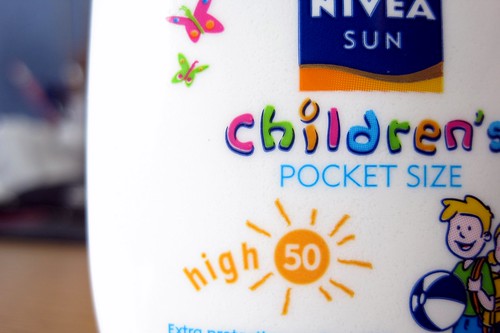 How many times have you found yourself in a drug store spending hours comparing each and every sunscreen product on the shelf? Well, by next summer, you’ll be able to reclaim those lost hours of blank staring. The U.S. Food and Drug Administration are forcing sunscreen producers to change their product labels. With the change in effect, consumers will know exactly what they are getting, no more false claims.
How many times have you found yourself in a drug store spending hours comparing each and every sunscreen product on the shelf? Well, by next summer, you’ll be able to reclaim those lost hours of blank staring. The U.S. Food and Drug Administration are forcing sunscreen producers to change their product labels. With the change in effect, consumers will know exactly what they are getting, no more false claims.
Currently, SPF ratings depict the amount of time the product protects the body against harmful UVB rays, the rays that cause sunburn, but your sunscreen should protect you from both UVB and UVA rays. However, only sunscreen labeled, “broad spectrum,” actually protects the body from both UVB and UVA rays; and both rays contribute to skin cancer and premature aging. What is really startling is, currently a sunscreen can be labeled “broad spectrum” but have minimal UVA protection. Under the current policies, consumers have no way of knowing how much full protection they are receiving from their “broad spectrum” sunscreens.
The new regulations target this issue. Sunscreens that do not offer adequate UVB and UVA protection will be required to prominently display a warning label stating, “these products have not been shown to prevent skin cancer.” Products that do meet the new “broad spectrum” qualifications and have a SPF rating of 15 or higher will have a label clearly affirming that the product reduces the risk of skin cancer and premature aging.
Along with these quality standards, sunscreen producers have to change their “water proof” or “sweat proof” claims. Waterproof sunscreen testing has proven that no sunscreen on the market is 100% water or sweat proof. Therefore, sunscreen products that pass a standard water test are only labeled “water resistant.”
The FDA has also proposed a SPF cap. Due to a lack of data, it is not proven that a SPF over 50 actually offers more protection.
With the new regulations in place, the FDA hopes consumers will now be aware of what products truly are offering the most protection. Major brands like Johnson and Johnson, Coppertone, and Neutrogena will have their newly labeled promotional sunscreen on shelves next summer. But in the mean time, look for “broad spectrum” sunscreen with an SPF of 30. And always, always re-apply! (every two hours :) )
Lauren
Multimedia Coordinator
